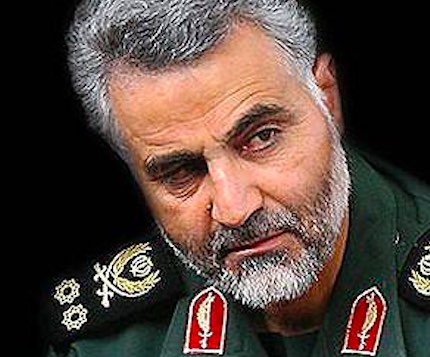
As far back as at least the American Revolution, there was an unwritten rule among combatants that you don’t kill the commander in the field of battle. That’s why generals could be seen directing their troops while sitting astride a horse behind the front lines —easy targets for anyone equipped with a rifled barrel on their long gun to pick off. The reason they felt relatively safe doing so was that it was that both sides understood that if commanding officers were fair game and one were slain, there’d be nobody to surrender or order a retreat, and all conflicts would be fought to the death.
Now President Trump has upended that logic by reportedly directly ordering the assassination, by drone-fired missile, of Commander of Iranian Forces Qassem Suleimani, who was on a visit to neighboring Iraq.
Some American media outlets are predictably reporting that Suleimani was “the world’s number one bad guy” and are reflexively praising Trump’s “resolute” response to the allegedly Iranian-sponsored Iraqi attack on the US Embassy compound in Baghdad. But aside from the problem that the assault on the embassy was actually a public reaction in Iraq to the US’s earlier outrageous and illegal aerial bombardment of an armed unit of Iraqi government-backed fighters, itself a response to the killing of a US “contractor” (mercenary soldier) in Iraq, what is actually accomplished by blowing up a military leader from Iran while he is inside another country, Iraq, in which the US actually has troops operating by invitation? Did Trump and his advisers consider what that insulting violation of Iraqi sovereignty will lead to?
More importantly, do President Trump and whatever moronic advisers he’s listening to actually think that by blowing up the head of Iran’s military they have incapacitated or intimidated Iran? And do they think that somehow Trump and his own generals are immune from an Iranian retaliation in kind?
Iran may not have the sophisticated missile-firing drones that would allow it to copy America’s action exactly, but its military and intelligence services certainly have skilled snipers, sappers and others technicians of death who are quite capable of taking out a US general, or even a president, pretty much at will if they decide that’s what they want to do.
Trump’s act of presidential bravado, about which I’m sure we’ll have to endure much presidential boasting at rallies and in tweet form, is heading us in an incredibly dangerous direction.
The US has long been an outlaw nation, waging illegal wars at will, and treating the entire globe as a free-fire zone for decades. But when it returns to the kind of assassination policies it was using routinely during the Cold War years (think Vietnamese President Ngo Dinh Diem and Congo Prime Minister Patrice Lumumba, as well as attempts on the lives of Fidel Castro, Slobodan Milosevic and Muammar Gaddafi, etc.), it is understandable why President Ronald Reagan, in a rare moment of lucidity in December 1981, signed Executive Order 12333 banning the government-ordered assassination of leaders. (Perhaps he was influenced by his own nearly fatal experience with an assassin’s bullet in March of that year.)
Going against that Reagan order as President Trump has done, is opening a deadly pandora’s box.
Rightly or wrongly (since we still don’t know who really assassinated President John F. Kennedy), Reagan and others in Washington were concerned that his slaying in 1963 might have been a response by Cuba to a spate of failed attempts by the US CIA to assassinate Cuban leader Fidel Castro.
Better to take assassinations off the War Room table, Reagan apparently decided.
Now we’re back in the law of the jungle, courtesy of Trump’s hit on Gen. Suleimani.
America’s top military brass need to understand that thanks to their Commander in Chief’s hit job on Suleimani, they all are now walking around with targets pinned on them. Trump himself, not a man who has ever demonstrated any kind of moral courage in his life, has to know that he has also put a big target on his own ample body.
Then also, there is the threat that this could all escalate into something far worse than tit-for-tat offings of leaders. Remember, it was the assassination of Archduke Franz Ferdinand in Sarajevo, Bosnia, that led to the catastrophic First World War.
Assassinations of leaders may seem to a shallow thinker like Trump like a simple, low-cost/low-risk way of sending a message, but depending upon how the country whose leader is assassinated responds, and how that response is responded to in turn by the country that perpetrated the initial assassination, that initial risk/reward evaluation can quickly be proven deadly wrong.
Already Iran’s “supreme leader” Ayatollah Ali Khamenei, has vowed “harsh revenge” for the assassination of Suleimani, who reportedly died along with Abu Mahdi al-Muhandis, head of an Iraqi armed force called the Popular Mobilization Force, and four other people in the US drone strike.
Maybe Trump, who has claimed in the past that he wants the US to pull out of conflicts in the Middle East, has decided like many a president before him, that looking tough and perhaps even fighting a little war during an election year could help him win re-election. If so he may be in for a big surprise.
The American people have grown tired of America’s endless wars, and are unlikely to cheer for yet another one, especially against a country as big as Iran, which is twice the size of Iraq. He will hopefully pay dearly for this hubristic blunder.
